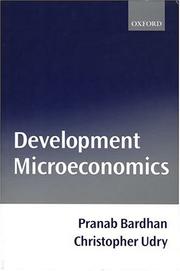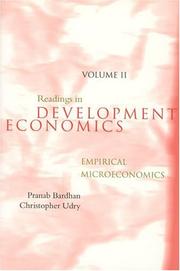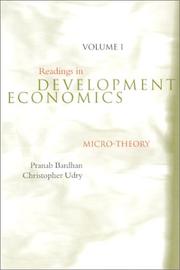| Listing 1 - 10 of 36 | << page >> |
Sort by
|
Digital
Year: 2016 Publisher: Cambridge, Mass. National Bureau of Economic Research
Abstract | Keywords | Export | Availability | Bookmark
 Loading...
Loading...Choose an application
- Reference Manager
- EndNote
- RefWorks (Direct export to RefWorks)
We examine the generalizability of internally valid estimates of causal effects in a fixed population over time when that population is subject to aggregate shocks. This temporal external validity is shown to depend upon the distribution of the aggregate shocks and the interaction between these shocks and the casual effects. We show that returns to investment in agriculture, small and medium enterprises and human capital differ significantly from year to year. We also show how returns to investments interact with specific aggregate shocks, and estimate the parameters of the distributions of these shocks. We show how to use these estimates to appropriately widen estimated confidence intervals to account for aggregate shocks.
Digital
Abstract | Keywords | Export | Availability | Bookmark
 Loading...
Loading...Choose an application
- Reference Manager
- EndNote
- RefWorks (Direct export to RefWorks)

ISBN: 0198773714 0198773706 0191595926 9786611989767 0191525030 1281989762 9780191525032 9780198773719 9780198773702 Year: 1999 Publisher: Oxford ; New York : Oxford University Press,
Abstract | Keywords | Export | Availability | Bookmark
 Loading...
Loading...Choose an application
- Reference Manager
- EndNote
- RefWorks (Direct export to RefWorks)
Traditional development economics has recently been revolutionized by the application of new economic tools and concepts. Development Microeconomics is the first in a series of books which will look at the entire spectrum of development economics issues, combining the strengths of conventional developmental thought with the insights of contemporary mainstream economics. High technical sophistication is avoided, and the only pre-requisite is some familiarity with the toolsof general microecomic theory at a first-year graduate or advanced undergraduate level. - ;Traditional development economics
Microeconomics --- Third World: economic development problems --- Microeconomics. --- Economic development. --- Micro-économie --- Développement économique --- Electronic books. -- local. --- Economic development --- Economic Theory --- Business & Economics --- 330.101 --- 330.104 --- 339.96 --- Development, Economic --- Economic growth --- Growth, Economic --- Economic policy --- Economics --- Statics and dynamics (Social sciences) --- Development economics --- Resource curse --- Price theory --- Economische analyse. Economische methodologie. Economische onderzoeksmethoden--(theoretische economie) --- Micro-economie --- Derde Wereld: economische ontwikkelingsproblematiek --- 330.101 Economische analyse. Economische methodologie. Economische onderzoeksmethoden--(theoretische economie) --- Micro-économie --- Développement économique --- E-books --- Developing countries: economic development problems --- Microéconomie

ISBN: 0262267705 142372528X 9780262267700 9780262024853 9781423725282 Year: 2000 Publisher: Cambridge, Mass. MIT Press
Abstract | Keywords | Export | Availability | Bookmark
 Loading...
Loading...Choose an application
- Reference Manager
- EndNote
- RefWorks (Direct export to RefWorks)
These two volumes of readings attempt to bring some degree of structure to a relatively diffuse field. Because of the sheer volume of high-quality work in development economics research, they are intended as a sampling of work at the frontier of the field, rather than as a comprehensive overview. Volume II: Empirical Microeconomics focuses on empirical work. Topics covered include the relationship between wages and health, the role of human capital and demographic change, the internal structure of households, information imperfections in factor markets, the permanent income hypothesis, the possibility of Pareto-efficient allocation of risk in villages, and the relationship between property rights and investment decisions.
Development economics. --- Microeconomics. --- ECONOMICS/Trade & Development --- Price theory --- Economics --- Economic development

ISBN: 9780262522823 0262522829 0262522837 9780262522830 Year: 2000 Publisher: Cambridge (Mass.) : MIT press,
Abstract | Keywords | Export | Availability | Bookmark
 Loading...
Loading...Choose an application
- Reference Manager
- EndNote
- RefWorks (Direct export to RefWorks)
Development economics --- Microeconomics --- Development economics. --- Microeconomics.
Digital
Year: 2013 Publisher: Cambridge, Mass. National Bureau of Economic Research
Abstract | Keywords | Export | Availability | Bookmark
 Loading...
Loading...Choose an application
- Reference Manager
- EndNote
- RefWorks (Direct export to RefWorks)
We use newly-available Indian panel data to estimate how the returns to planting-stage investments vary by rainfall realizations. We show that the forecasts significantly affect farmer investment decisions and that these responses account for a substantial fraction of the inter-annual variability in planting-stage investments, that the skill of the forecasts varies across areas of India, and that farmers respond more strongly to the forecast where there is more forecast skill and not at all when there is no skill. We show, using an IV strategy in which the Indian government forecast of monsoon rainfall serves as the main instrument, that the return to agricultural investment depends substantially on the conditions under which it is estimated. Using the full rainfall distribution and our profit function estimates, we find that Indian farmers on average under-invest, by a factor of three, when we compare actual levels of investments to the optimal investment level that maximizes expected profits. Farmers who use skilled forecasts have increased average profit levels but also have more variable profits compared with farmers without access to forecasts. Even modest improvements in forecast skill would substantially increase average profits.
Digital
Year: 2014 Publisher: Cambridge, Mass. National Bureau of Economic Research
Abstract | Keywords | Export | Availability | Bookmark
 Loading...
Loading...Choose an application
- Reference Manager
- EndNote
- RefWorks (Direct export to RefWorks)
We look at the effects of rainfall forecasts and realized rainfall on equilibrium agricultural wages over the course of the agricultural production cycle. We show theoretically that a forecast of good weather can lower wages in the planting stage, by lowering ex ante out-migration, and can exacerbate the negative impact of adverse weather on harvest-stage wages. Using Indian household panel data describing early-season migration and district-level planting- and harvest-stage wages over the period 2005-2010, we find results consistent with the model, indicating that rainfall forecasts improve labor allocations on average but exacerbate wage volatility because they are imperfect.
Digital
Year: 2019 Publisher: Cambridge, Mass. National Bureau of Economic Research
Abstract | Keywords | Export | Availability | Bookmark
 Loading...
Loading...Choose an application
- Reference Manager
- EndNote
- RefWorks (Direct export to RefWorks)
Standard measures of productivity display enormous dispersion across farms in Africa. Crop yields and input intensities appear to vary greatly, seemingly in conflict with a model of efficient allocation across farms. In this paper, we present a theoretical framework for distinguishing between measurement error, unobserved heterogeneity, and potential misallocation. Using rich panel data from farms in Tanzania and Uganda, we estimate our model using a flexible specification in which we allow for several kinds of measurement error and heterogeneity. We find that measurement error and heterogeneity together account for a large fraction - as much as ninety percent -- of the dispersion in measured productivity. In contrast to some previous estimates, we suggest that the potential for efficiency gains through reallocation of land across farms and farmers may be relatively modest.
Digital
Year: 2012 Publisher: Cambridge, Mass. National Bureau of Economic Research
Abstract | Keywords | Export | Availability | Bookmark
 Loading...
Loading...Choose an application
- Reference Manager
- EndNote
- RefWorks (Direct export to RefWorks)
Many basic economic theories with perfectly functioning markets do not predict the existence of the vast number of microenterprises readily observed across the world. We put forward a model that illuminates why financial and managerial capital constraints may impede experimentation, and thus limit learning about the profitability of alternative firm sizes. The model shows how lack of information about one's own type, but willingness to experiment to learn one's type, may lead to short-run negative expected returns to investments on average, with some outliers succeeding. To test the model we put forward first a motivating experiment from Ghana, and second a small meta-analysis of other experiments. In the Ghana experiment, we provide inputs to microenterprises, specifically financial capital (a cash grant) and managerial capital (consulting services), to catalyze adoption of investments and practices aimed towards enterprise growth. We find that entrepreneurs invest the cash, and take the advice, but both lead to lower profits on average. In the long run, they revert back to their prior scale of operations. The small meta analysis includes results from 18 other experiments in which either capital or managerial capital were relaxed, and find mixed support for this theory.
Book
Year: 2019 Publisher: Cambridge, Mass. National Bureau of Economic Research
Abstract | Keywords | Export | Availability | Bookmark
 Loading...
Loading...Choose an application
- Reference Manager
- EndNote
- RefWorks (Direct export to RefWorks)
The livelihoods of the majority of the world's poor depend on agriculture. They face substantial risk from fluctuations in weather conditions. Better risk, credit and savings markets can improve productivity and welfare in rural areas but entail high administrative costs. We consider a classic public good with benefits that theoretically exceed those of perfect insurance contracts - improving the skill of long-run weather forecasts. We use an equilibrium model of agricultural production and labor migration, and a variety of Indian panel datasets to assess quantitatively the effects of improvements in seasonal forecasts of monsoon weather. We find that in areas where the forecast is accurate (has "skill") that investment, migration and rural wages respond to forecasts. We calculate that if such skill were pervasive across India, the total value of an accurate forecast for farmers and wage workers is in the tens of billions of rupees.
| Listing 1 - 10 of 36 | << page >> |
Sort by
|

 Search
Search Feedback
Feedback About UniCat
About UniCat  Help
Help News
News